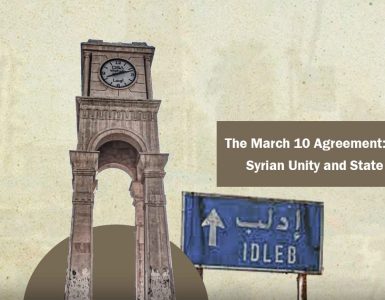On Wednesday, a large gathering of sheikhs and notables of Raqqa discussed the mechanisms of reaching a societal and political cohesion during a symposium held in the meeting room of the Syrian Democratic Council in the city of Raqqa.
The sheikhs and notables of the clans in Raqqa and the societal and political events, in addition to the participation of the co-presidency of the Raqqa Civil Council and the Chairman of Relation Bureau of the Syrian Democratic Forces, Participated in the symposium at the invitation that was by the Relations Bureau of the Syrian Democratic Council.
Sheikh Muhammad Nour Al-Theeb, the Co-chairman of Raqqa Civil Council, pointed out how to expand the Syrian national framework with the efforts of clans and community activities, based on its historical role in confronting the occupations. Al-Theeb considered the clan as a community system in which all of its people are characterized by the same rights and duties.
The meeting dealt with ways to enhance societal and political cohesion in light of the Syrian crisis, which disintegrated society, and mechanisms for the advancement of society again, strengthening the concept of citizenship, establishing moral values, and focusing on the role of clans and their elders.
The Chairman of military relations of the Syrian Democratic Forces, Mustafa Bali, talked about the importance of societal cohesion and stability and the role of the family and clan during crises in maintaining civil peace and cohesion and overcoming the challenges facing them.
For his part, a member of the Relations Bureau of the Syrian Democratic Council, Kamel Al-Hazbar, pointed to the continuation of the Syrian clans and their common history, that they are as part of the regional environment and their abilities, in light of obstruction of prospects of resolutions for the Syrian crisis, to save the situation and draw board outlines for a resolution.
The attendees participated in presenting proposals and mentioning the national project led by the Syrian Democratic Council for the sake of the Syrian resolution, achieving the demands of the Syrians for change, and building the political regime based on participation and respecting the privacy of the Syrian regions and components.
On the other hand, the participants unanimously agreed on the need to give the clans the chance to follow up and play an active role in uniting the administration and the community, and to be the mouthpiece of the community in expressing the basic needs of the people and service matters.
In turn, the politician Muhammad al-Nasser, a member of the General Council of the Democratic Union Party, stated that “Societal cohesion is achieved through achieving social justice and equality for all, engaging in institutions, moving away from previous experiences, and eliminating corruption through real study, transparency, and mutual credibility between the administration and community”.
It is noteworthy that this meeting came in response to the desire of the sheikhs and notables who were visited by the delegation of the Syrian Democratic Council in the city of Raqqa and its countryside, and it was concluded with the formation of a committee headed by Sheikh Lawrence Al-Borsan to follow up on the implementation of the requirements.
















